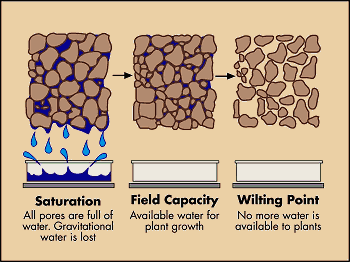|
|
|
|
 |
|
|
|
|
||||||||||||||||||||
|
Water Holding Capacity(WHC) : Also called the drained upper limit (DUL) Soils are porous materials - like sponges, they drain excess water rapidly after saturation - the water remaining after after this rapid drainage phase is called the ‘water holding capacity of a soil’, and is the maximum useful amount of water the soil can hold. Irrigators should irrigate to put this amount of water into a soil plus a small amount |
|
Wilting Point (WP) : also called lower water limit (LL). Some soils hold onto water so hard that plants cannot extract it all. If the WHC is the highest (useful) water content then the WP is the lowest. While it is poorly named (many plants wilt long before the soil is this dry) the WP tells us how much water is left in a soil when plants have extracted all they can in limited time. WP an be done on a disturbed sample of soil (about 200g) $30 each. |
|||||||
|
Available Water Capacity (or content) of a soil requires both the above tests. We can also do the tests to measure Readily Available water (RAW) |
|||||||
|
Water Retention Relationship: Soil Scientists will know that these two points are just two points on the soil water holding relationship. Soil Water Solutions can measure the whole curve, and can use it to supply derived information such as the relative hydraulic conductivity curve and pore size distribution in the soil.. |
|||||||
|
Other soil properties can be supplied as part of the above tests or supplementary to them Soil density, total porosity, and air filled porosity at field capacity are included for tests based on undisturbed samples. saturated hydraulic conductivity can be measured using unit gradient (on cores) for $50 per sample. If only disturbed material is available, a core can be manufactured to simulate a material spread and compacted using usual engineering methods. and all the above tests can be done - HOWEVER the properties of the manufactured material may differ from the final field material. Penetrometer strength at field capacity (or other points) can be measured during testing ($5), This can establish if the soil is soft enough to allow root development at (for example) field capacity. also dispersion index ($5), salinity ($5), pH ($5), non wetting properties. |
|||||||

